Do You Need A Foundation For A Shed?
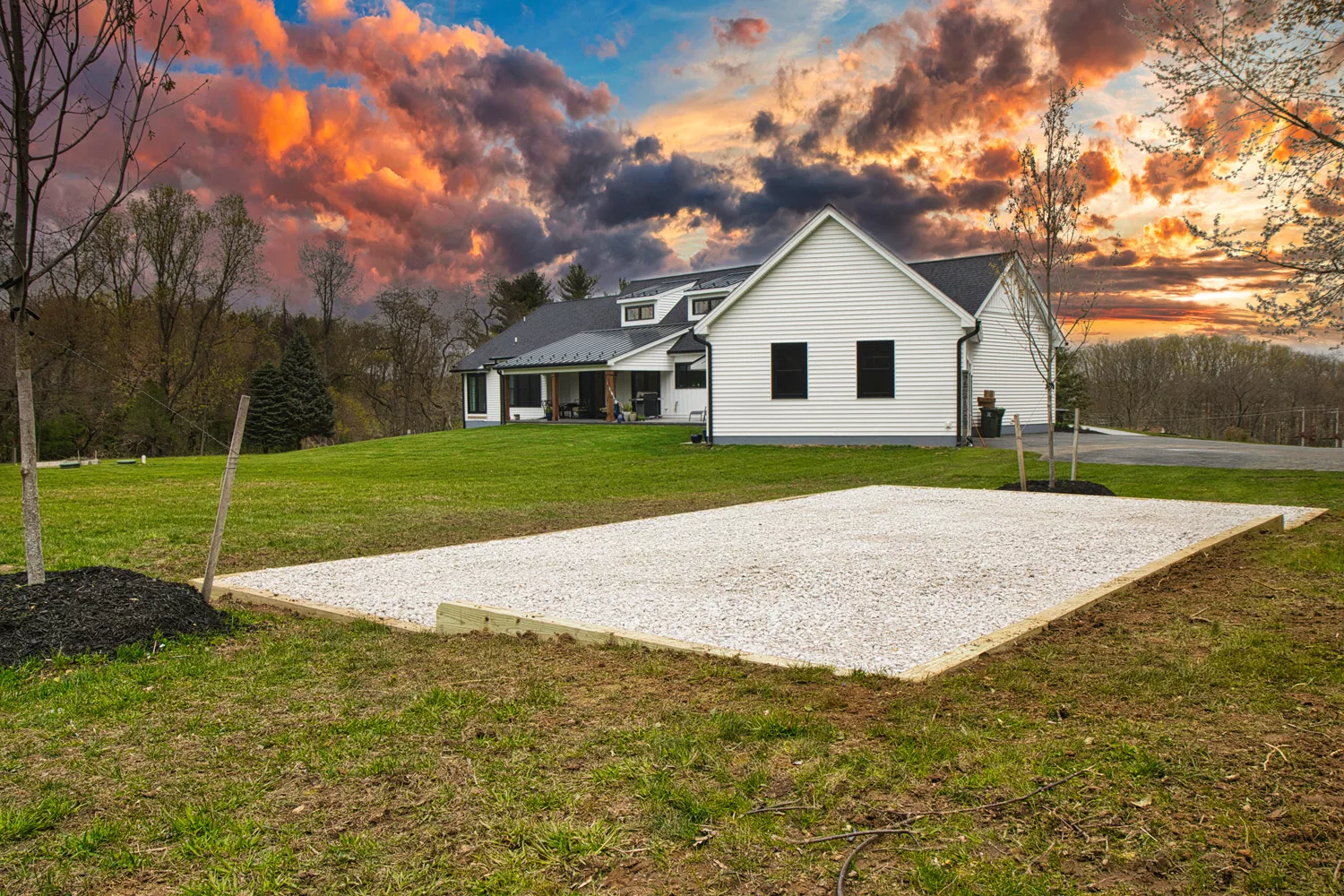
If you’re in need of some extra storage space or a workshop area, owning a shed can be a great solution. Not only can a shed provide the extra space you need, but it can also add value to your property and be a fun and rewarding DIY project if you are planning on building it yourself.
Having a foundation for your shed is important for several reasons. Here are some of the key reasons why a foundation is necessary for a shed:
- Stability: A foundation provides a stable and level base for your shed. This is important to prevent the shed from settling or shifting over time, which can cause structural issues and make it difficult to use the shed.
- Durability: A foundation helps to protect your shed from moisture and dampness by elevating it off the ground. This can help to prevent rot, decay, and other damage to the wood or other materials of the shed.
- Longevity: A well-built foundation can help to extend the life of your shed by providing a solid base that can withstand the weight and stresses of the structure.
- Compliance: Depending on your local building codes and regulations, a foundation may be required for your shed in order to comply with zoning and safety requirements.
Overall, a foundation is an important investment in the longevity and stability of your shed. By providing a solid base for the structure, you can ensure that your shed is secure and protected from the elements for many years to come.
In this article, we are going to be going over why a foundation is needed for a shed, the different types of foundations & how to choose the right one. Let’s start by asking the “why”.
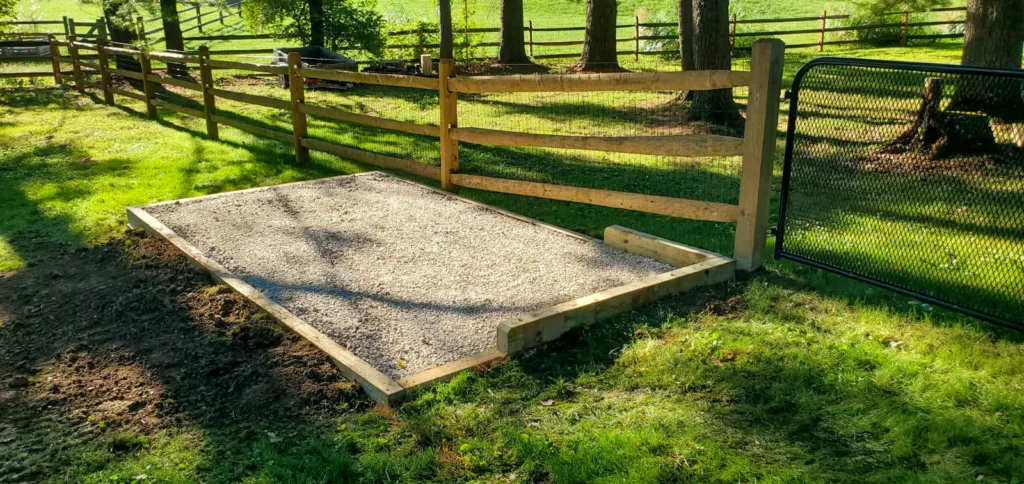
Having a stable and level base for your shed is critical for a number of reasons:
- Structural stability: A stable and level base helps to evenly distribute the weight of the shed across the foundation. This helps to prevent structural issues such as settling or shifting of the shed over time, which can cause damage and compromise the integrity of the structure.
- Safety: A level foundation reduces the risk of tripping hazards around the shed, making it safer to move around and work in. It also ensures that doors and windows on the shed operate properly, reducing the risk of accidents.
- Protection from moisture: A level foundation ensures that rainwater and other moisture can properly drain away from the shed. If the foundation is uneven, water can pool around the base of the shed, leading to rot and other forms of damage.
- Aesthetics: A level foundation provides a more attractive appearance for your shed. A shed that is sloping or uneven can look unprofessional and detract from the overall appearance of your property.
In summary, having a stable and level base for your shed is crucial for ensuring the safety and longevity of the structure, protecting it from moisture, and enhancing its appearance. A well-built foundation will provide a solid base for the shed and ensure that it remains level and stable for many years to come.
A Foundation Prevents Settling & Shifting
A solid foundation is essential for ensuring the stability and durability of a shed, and it can help prevent issues like settling and shifting. Here are some ways a foundation can help prevent these problems:
- Even weight distribution: A foundation spreads the weight of the shed evenly across the base, providing a stable platform for the structure. This helps prevent the shed from sinking or shifting over time, which can lead to structural damage.
- Proper drainage: A well-built foundation ensures proper drainage around the shed, which helps prevent water from accumulating and causing soil erosion or foundation movement. If water is allowed to pool or accumulate around the shed, it can weaken the foundation and cause it to shift or settle over time.
- Proper materials: The choice of materials for the foundation is also important for preventing settling and shifting. A properly built foundation should be constructed with sturdy materials such as concrete or pressure-treated lumber, which can withstand the weight of the shed and resist movement.
- Professional installation: Having the foundation installed by a professional can help ensure that it is properly constructed and installed. This reduces the risk of issues such as uneven settling, which can lead to structural damage and instability.
In summary, a well-built foundation is essential for preventing issues such as settling and shifting. By providing a solid, even base for the shed and ensuring proper drainage and materials, a foundation can help protect the structure from damage and maintain its stability for years to come.
A Foundation Elevates The Shed To Prevent It From Moisture
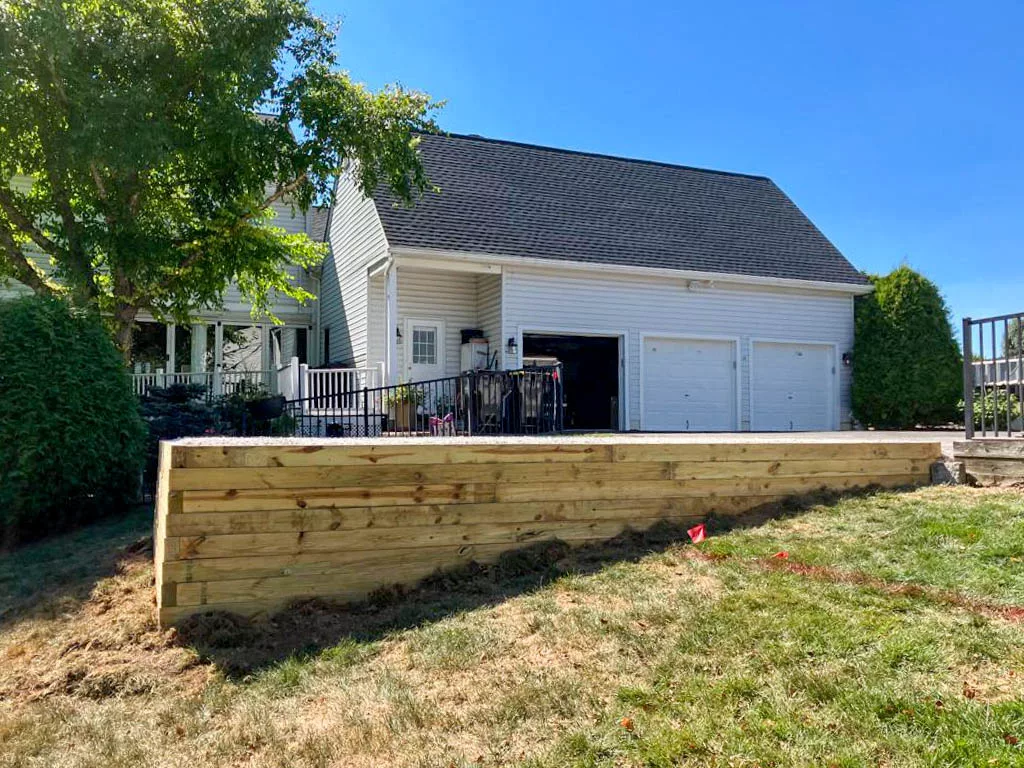
When a shed is placed directly on the ground, moisture from the soil can seep into the wood or other materials of the shed, leading to rot and decay. By elevating the shed off the ground, it is protected from moisture coming up from the soil.
Elevating the shed off the ground also allows for air to circulate underneath, which can help prevent moisture buildup. This is especially important in humid climates, where moisture can be a major problem for sheds and other outdoor structures.
Overall, elevating a shed off the ground is an important step in protecting it from moisture and other potential problems. By providing a barrier from the ground, allowing for proper ventilation, and reducing the risk of pests, an elevated shed can remain in good condition and provide years of use.
Types Of Shed Foundations
The type of foundation used for a shed can have a significant impact on the stability, durability, and longevity of the structure. Here are some of the most common types of foundations that can be used for a shed:
Gravel Shed Foundations
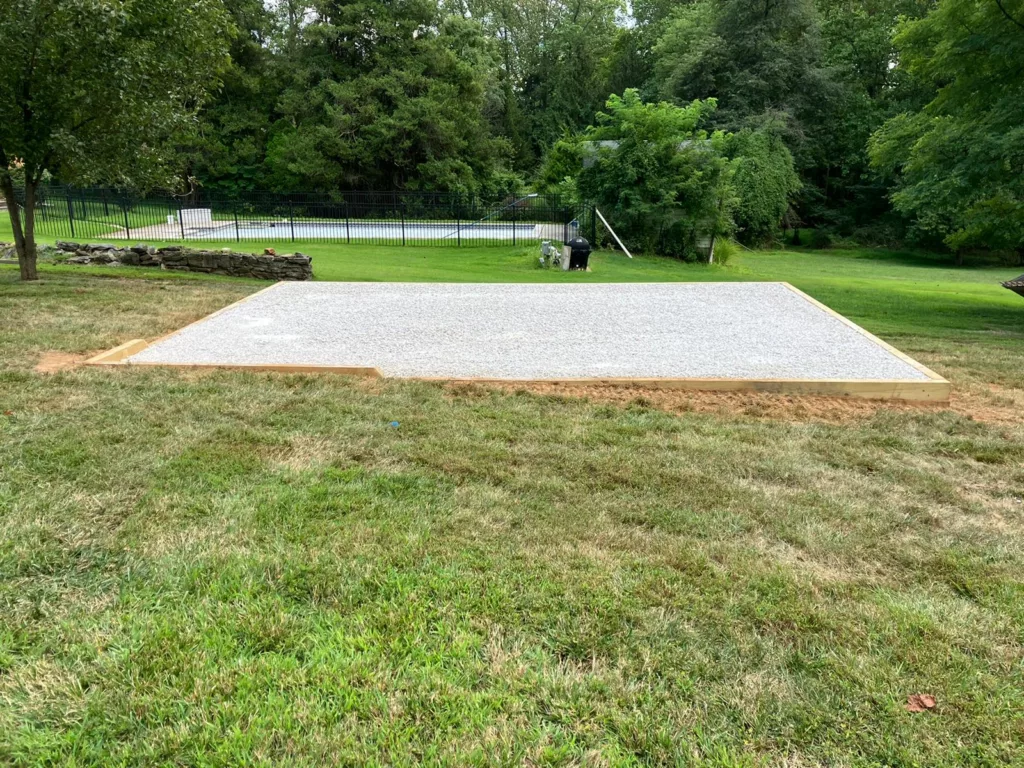
A gravel shed foundation involves laying a layer of crushed stones or gravel on top of the ground to create a stable base for the shed. This type of foundation is easy to install, relatively inexpensive, and can be a good option if the ground is relatively level. However, it may not be the best choice for areas with heavy rainfall or poor drainage, as water can collect under the shed and cause the foundation to sink.
Pros:
- Gravel is relatively inexpensive and easy to install, especially compared to concrete.
- Gravel can be a good option for sheds that are relatively small and light, as it provides good drainage and can be compacted to create a stable base.
- Gravel is an excellent choice for temporary structures as it can be easily removed when it’s no longer needed.
Cons:
- Gravel may not be the best choice for areas with heavy rainfall or poor drainage as water can collect under the shed and cause the foundation to sink.
- Gravel can shift or settle over time, leading to an uneven foundation that can compromise the shed’s stability.
- Gravel is not a permanent foundation and may need to be refreshed or redone over time.
Concrete Shed Foundations
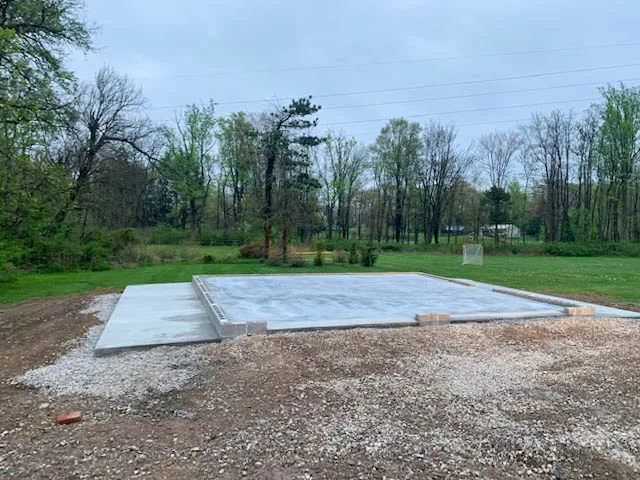
A concrete foundation involves pouring a slab of concrete onto the ground to create a solid, level base for the shed. This type of foundation is very durable and can provide excellent support for larger or heavier sheds. However, it can be more expensive and time-consuming to install than other types of foundations.
Pros:
- A concrete foundation is very durable and long-lasting, providing excellent support for larger or heavier sheds.
- A concrete foundation is resistant to moisture and can help protect the shed from flooding.
- Concrete can be reinforced with steel or fiber to provide additional strength and stability.
Cons:
- A concrete foundation is typically more expensive and time-consuming to install than gravel.
- Concrete can crack over time, particularly in areas with temperature fluctuations, which can compromise its stability.
- Concrete is a permanent foundation, making it challenging to remove or modify once it’s installed.
In summary, the choice of foundation for a shed depends on various factors, such as the size and weight of the shed, the ground condition, and the budget. Each foundation type has its advantages and disadvantages, so it’s essential to evaluate your needs carefully before making a decision.
How To Choose The Right Foundation For Your Shed
Choosing the right foundation for your shed is essential to ensure that it’s stable, level, and durable. Here are some of the factors to consider when choosing a foundation:
Size and Weight of the Shed
The size and weight of the shed are crucial factors in determining the type of foundation you need. Larger or heavier sheds require a more robust foundation than smaller or lighter sheds.
Type of Soil and Terrain
The type of soil and terrain on your property can also impact the type of foundation you choose. If the soil is loose or sandy, a gravel or pier foundation may be a better option. If the ground is rocky or uneven, a wood or concrete foundation may be more appropriate.
Climate and Drainage
Your local climate and drainage conditions can also impact the type of foundation you choose. If your property is prone to flooding or heavy rainfall, a raised foundation or concrete slab may be necessary to protect the shed from moisture damage.
Local Building Codes
It’s important to check your local building codes and regulations before choosing a foundation. Some areas may have specific requirements for shed foundations based on factors like size, weight, and location on the property.
Cost and Ease of Installation
Finally, it’s important to consider the cost and ease of installation when choosing a foundation. Some types of foundations, like gravel or wood, can be more affordable and easier to install than concrete or pier foundations.
In summary, choosing the right foundation for your shed requires careful consideration of factors like shed size and weight, soil and terrain, climate and drainage, local building codes, and cost and ease of installation. Taking the time to evaluate these factors can help ensure that your shed has a stable, durable, and long-lasting foundation.
Get Started On Your Shed Foundation
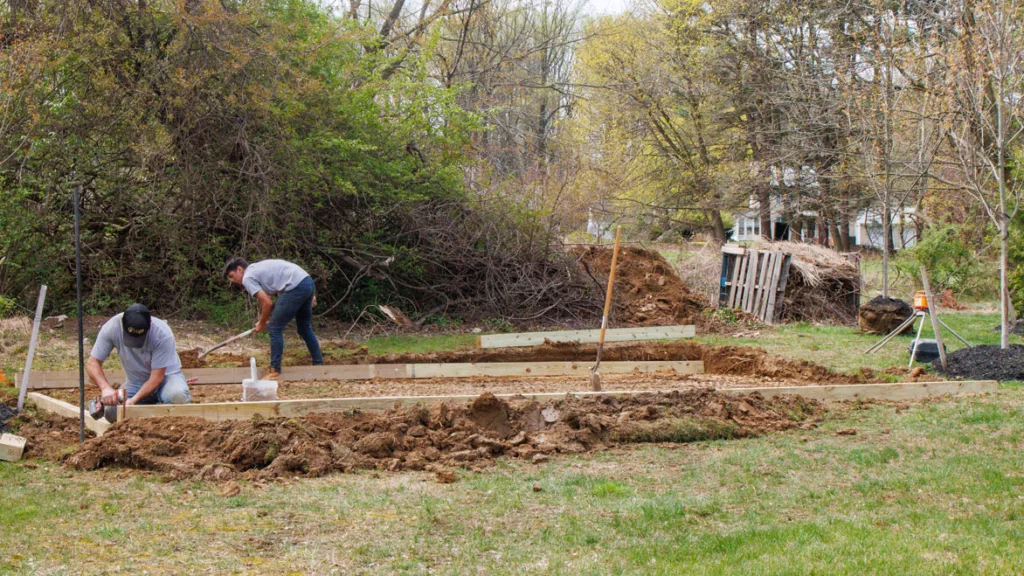
While it’s possible to install a shed foundation on your own, it’s always a good idea to consult with a professional to ensure that you choose the right type of foundation for your specific needs. A professional can evaluate factors like the size and weight of your shed, the soil and terrain on your property, and your local building codes to help you make an informed decision about the type of foundation that will work best.
A professional can also ensure that the foundation is installed correctly and in compliance with local building codes, which can help prevent future problems and ensure that your shed is stable and safe.
Investing in a professional consultation for your shed foundation can provide peace of mind and help you avoid costly mistakes. Whether you’re building a shed for storage, workspace, or recreation, a solid foundation is essential for ensuring that it’s stable, level, and durable for years to come. So, if you’re planning to build a shed, be sure to consult with a professional to determine the best foundation for your specific needs.
If you are located in Pennsylvania, Maryland, Delaware, or New Jersey, Firm Foundations can help you build a gravel or concrete foundation for your next project. You can get started by requesting a free quote below!
